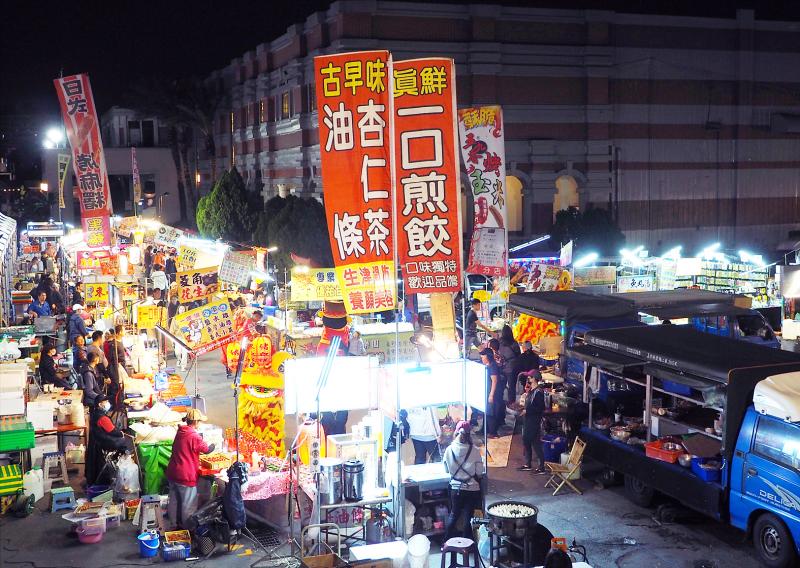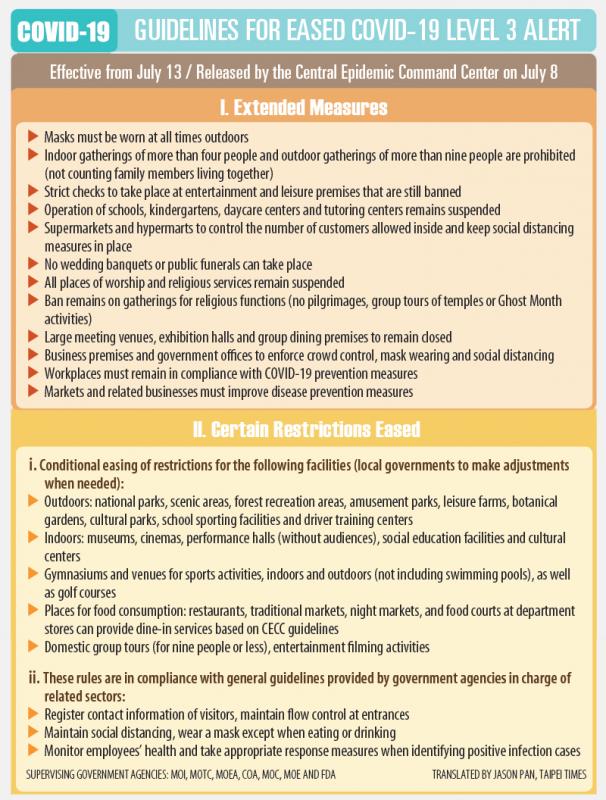The Central Epidemic Command Center (CECC) yesterday extended a nationwide level 3 COVID-19 alert to July 26, although some measures are to be relaxed on Tuesday next week.
The alert was first issued on May 15 in Taipei and New Taipei City, before being expanded nationwide four days later. It was to expire on Monday next week, but was extended for a fourth time yesterday.
The nation is “very close” to having indicators fall below the criteria for a level 3 alert, Minister of Health and Welfare Chen Shih-chung (陳時中), who heads the center, told a daily news briefing in Taipei.

Photo: Chen Feng-li, Taipei Times
According to CECC guidelines, a level 3 COVID-19 alert is activated when there have been more than three community clusters in a single week, or more than 10 domestic cases with unknown sources of infection in a single day.
“We think we should still be cautious,” Chen said.
Although the alert would remain in effect, restrictions are to be eased moderately and on a conditional basis, he said.

Local governments are to be allowed to make adjustments, he said.
Prohibitions on wedding banquets and public funerals would remain, said Deputy Minister of the Interior Chen Tsung-yen (陳宗彥), the CECC’s deputy head.
Religious sites can apply with local authorities to reopen, as long as they cap attendance at 99 people and follow ministry guidelines, Chen Tsung-yen said.
Other religious activities, including Ghost Festival celebrations, remain suspended, he said.
National parks would enforce crowd controls and operate at 40 percent capacity, calculated based on the number of parking spaces, he said.
Mountain lodges and protected areas in national parks, as well as beaches within the jurisdiction of Kenting National Park, would remain closed to the public, he said.
Public libraries are to be allowed to lend books at a single counter, although members of the public would generally not be permitted inside, Deputy Minister of Education Lio Mon-chi (劉孟奇) said.
Outdoor fields at elementary, junior high and high schools may open for exercise activities while abiding by local authorities’ measures, Lio said.
However, sports facilities and other installations at fields may not be used, he said, adding that eating and drinking are also prohibited.
Indoor and outdoor exercise and sports venues may function at up to 25 percent capacity, he said.
People may not share equipment, and must avoid physical contact and competitions, he said.
Restrooms and changing rooms may be used if they are properly cleaned and disinfected, Lio said.
Swimming pools, showers, saunas and steam rooms would not be open, he added.
Group and one-on-one instructors must undergo a rapid antigen test before restarting classes and be tested every seven days thereafter, he said.
Class sizes must be reduced and scheduled at least one hour apart to allow for cleaning and disinfection, Lio said.
Exhibition venues may open to visitors with appointments, with no more than 100 people allowed in at a time, Deputy Minister of Culture Hsiao Tsung-huang (蕭宗煌) said.
Performance venues may hold closed-door rehearsals, Hsiao said.
Movie theaters are advised to use advance booking systems, he said, adding that audiences would not be allowed to eat or drink.
Film crews must fill out health declaration forms and are recommended to undergo rapid screening for COVID-19 three days before shooting begins, he said.
During filming, they should be screened for COVID-19 at least once a week, Hsiao said.
While unexpected issues are bound to arise as restrictions are relaxed, the center would review the measures on a rolling basis, Chen Shih-chung said.
The goal is to lower the COVID-19 alert level after July 26, he said, urging the nation to work together to achieve the goal.

The Ministry of Foreign Affairs (MOFA) yesterday said it is closely monitoring developments in Venezuela, and would continue to cooperate with democratic allies and work together for regional and global security, stability, and prosperity. The remarks came after the US on Saturday launched a series of airstrikes in Venezuela and kidnapped Venezuelan President Nicolas Maduro, who was later flown to New York along with his wife. The pair face US charges related to drug trafficking and alleged cooperation with gangs designated as terrorist organizations. Maduro has denied the allegations. The ministry said that it is closely monitoring the political and economic situation

UNRELENTING: China attempted cyberattacks on Taiwan’s critical infrastructure 2.63 million times per day last year, up from 1.23 million in 2023, the NSB said China’s cyberarmy has long engaged in cyberattacks against Taiwan’s critical infrastructure, employing diverse and evolving tactics, the National Security Bureau (NSB) said yesterday, adding that cyberattacks on critical energy infrastructure last year increased 10-fold compared with the previous year. The NSB yesterday released a report titled Analysis on China’s Cyber Threats to Taiwan’s Critical Infrastructure in 2025, outlining the number of cyberattacks, major tactics and hacker groups. Taiwan’s national intelligence community identified a large number of cybersecurity incidents last year, the bureau said in a statement. China’s cyberarmy last year launched an average of 2.63 million intrusion attempts per day targeting Taiwan’s critical

‘SLICING METHOD’: In the event of a blockade, the China Coast Guard would intercept Taiwanese ships while its navy would seek to deter foreign intervention China’s military drills around Taiwan this week signaled potential strategies to cut the nation off from energy supplies and foreign military assistance, a US think tank report said. The Chinese People’s Liberation Army (PLA) conducted what it called “Justice Mission 2025” exercises from Monday to Tuesday in five maritime zones and airspace around Taiwan, calling them a warning to “Taiwanese independence” forces. In a report released on Wednesday, the Institute for the Study of War said the exercises effectively simulated blocking shipping routes to major port cities, including Kaohsiung, Keelung and Hualien. Taiwan would be highly vulnerable under such a blockade, because it

UNDER WAY: The contract for advanced sensor systems would be fulfilled in Florida, and is expected to be completed by June 2031, the Pentagon said Lockheed Martin has been given a contract involving foreign military sales to Taiwan to meet what Washington calls “an urgent operational need” of Taiwan’s air force, the Pentagon said on Wednesday. The contract has a ceiling value of US$328.5 million, with US$157.3 million in foreign military sales funds obligated at the time of award, the Pentagon said in a statement. “This contract provides for the procurement and delivery of 55 Infrared Search and Track Legion Enhanced Sensor Pods, processors, pod containers and processor containers required to meet the urgent operational need of the Taiwan air force,” it said. The contract’s work would be